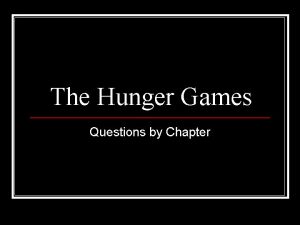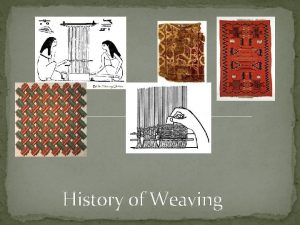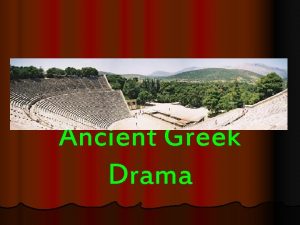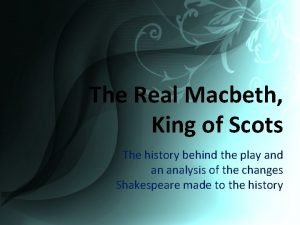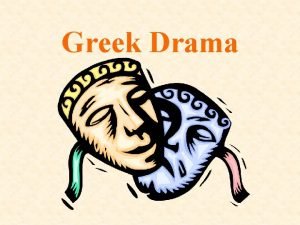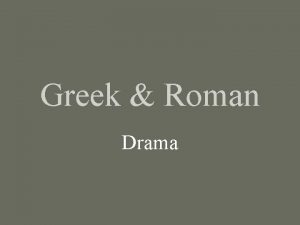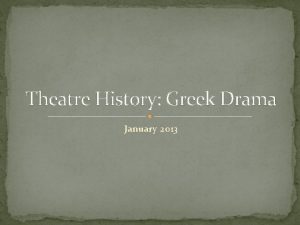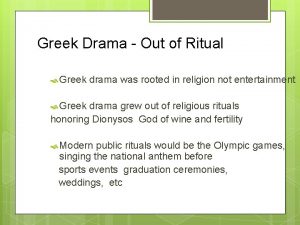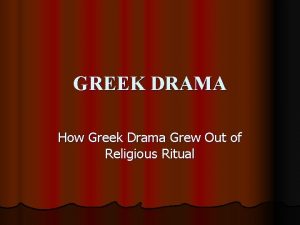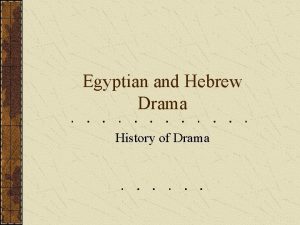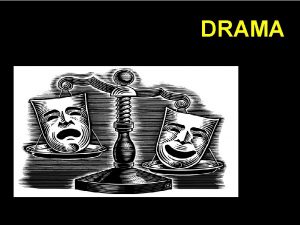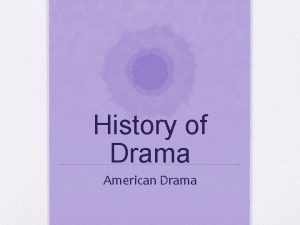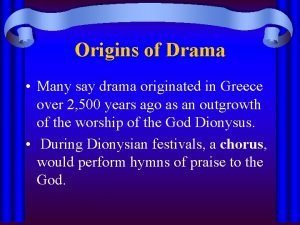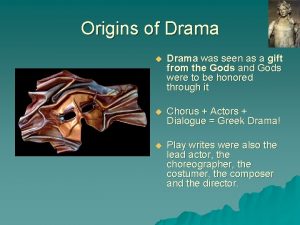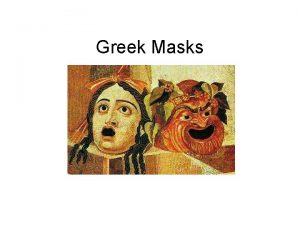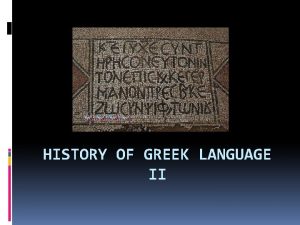History of Drama Greek Drama Origins of Greek

























- Slides: 25

History of Drama Greek Drama

Origins of Greek Drama v Began in the 6 th Century B. C. as part of the worship of the Greek god, Dionysus.

Origins of Greek Drama v A group of dancers, called a chorus, danced around an altar and commemorated the god’s death by sacrificing a goat. v Therefore, this chorus was called goat-singers and their ritualistic song was called the goat-song or tragos. v Our word tragedy comes from tragos.

Origins of Greek Drama v These ceremonies in honor of Dionysus evolved into dramatic contests. v A playwright named Thespis won the first competition, which was to write the best tragedy. v Thespis is, however, more well -known for being the first ever actor.

Origins of Greek Drama v During a production, Thespis stepped out from the chorus and engaged in dialogue with the other actors. v Until this point, “actors” did not portray other people—they only spoke as themselves. v Thespis also introduced masks to Greek theatre, which were used to help distinguish multiple characters played by the same actor. v The term thespian is derived from his name.

Origins of Greek Drama v The dramatic contests became part of a festival that lasted for five or six days. v On each of the last three days of the festival, a different playwright would produce four plays.

Origins of Greek Drama v The first three were tragedies that formed a trilogy. v The last play was often an irreverent, bawdy burlesque called a satyr play. v Playwrights competed to win the laurel wreath, which was the ancient Greek equivalent of a trophy.

Ancient Greek Production v At first, performances were held in the open hillsides surrounding a circular area called the orchestra, where the chorus danced. v Wooden, and later stone, seats were added to form theatre. v Some of these theatres could seat over 17, 000 patrons.

Ancient Greek Production v At the rear of the acting area was a small hut called the skene, where the actors changed masks and costumes. v Later, this building was enlarged into a stone building, a second story was added, and scenery was painted on the front. v The roof was known as the god walk, because the actors portraying gods would stand on it when delivering monologues.

Ancient Greek Production v Another device used in Greek plays was the machina, a crank like hoist that permitted actors to appear above the stage as if they were flying. v This mechanism was sturdy enough to carry a chariot and horses or several people.

Ancient Greek Production v Usually, the character lowered onto the stage represented a god from Olympus who came to settle the affairs of human beings. v Oftentimes playwrights could not resolve the conflict of the plays on their own, so they had the gods come and fix everything. v It is from this contrivance that we get the term deus ex machina or god from the machine

Ancient Greek Production v This term deus ex machina is still used today to indicate an artificial plot device an author introduces late in the play or story to resolve difficulties. v Common examples include an unknown relative who leaves a legacy, a long-lost sister, or the discovery of a character assumed to be dead. v Usually such a plot resolution greatly weakens the plot of the play.

Ancient Greek Production v The chorus was an integral part of early Greek plays. v They served to explain the situation, bring the audience up-to-date, make commentary on the action of the play, and engage in dialogue with the actors.

Ancient Greek Production v Over time the chorus diminished as the characters of the play expanded. v We still see varieties of the Greek Chorus in the stage manager from Our Town and El Gallo in The Fantasticks.

Ancient Greek Tragedies v Involve conflicts that evolve from the clash between the will of the gods and the ambitions and desires of humanity. v The plays illustrated how useless human efforts are in the face of fate. v The greatest writers of Greek tragedy were Aeschylus, Sophocles, and Euripides, who all wrote in the 4 th and 5 th Centuries B. C.

Ancient Greek Tragedy v Aeschylus is known as the father of tragedy. v His most famous work, The Oresteia, tells the story of the murder of Agamemnon, the revenge taken by his children, and the punishment and acquittal of his son.

Ancient Greek Tragedy v Of Aeschylus’ ninety plays, only 7 have been preserved. v He is known for reducing the size of the chorus and expanding the number of actors.

Ancient Greek Tragedy v Sophocles is ranked with Shakespeare as one of the greatest playwrights of all time. v He is most known for allowing his characters to question both fate and the gods.

Ancient Greek Tragedy v Sophocles wrote over 100 plays, and only 7 have survived. v His most famous work, Oedipus Rex, is known as the ideal tragedy and one of the most powerful examples of dramatic irony.

Ancient Greek Tragedy v Euripides became more interested in people’s lives than in the religious views of his day. v Of his 92 plays written, 18 still exist in their entirety.

Ancient Greek Tragedy v Euripides’ most famous play, Medea, is the tragedy of a woman who seeks revenge upon her husband. v She goes so far as to kill her own children just to hurt him. v Along with Antigone, the protagonist of Sophocles’ sequel to Oedipus Rex, Medea is ranked as one of the most poignant portrayals of women in dramatic literature.

Ancient Greek Comedy v Although tragedy was the true art of Ancient Greek theatre, some playwrights, such as Aristophanes and Menander found success in writing comedy.

Ancient Greek Comedy v Aristophanes considered nothing sacred and was a skilled satirist and a keen observer of humanity. v He often mocked the leaders of Athens and the gods themselves.

Ancient Greek Comedy v Aristophanes’ most famous plays include The Frogs, which shows a writers’ contest between Aristophanes and Aeschylus in Hades and Lysistrata, which is a scathing attack on war. v Of his 40 plays, only 11 have been preserved.

Ancient Greek Comedy v Menander wrote more gentle comedies than Aristophanes. v He wrote 100 years after Aristophanes. v Of his 100+ scripts, only Dyskolos, a play about how the mischievous god Pan makes a married man fall in love with another woman, survives.
 Greek drama history
Greek drama history Cenutar
Cenutar Soap serial
Soap serial Eğitici drama ve yaratıcı drama arasındaki fark
Eğitici drama ve yaratıcı drama arasındaki fark What is drama
What is drama Dalam bahasa yunani kuno drama disebut dengan
Dalam bahasa yunani kuno drama disebut dengan Sociolgist
Sociolgist Selection and gradation in language teaching
Selection and gradation in language teaching Origins of kefir
Origins of kefir Hunger games chapter 22 questions and answers
Hunger games chapter 22 questions and answers Historical origins of the health belief model
Historical origins of the health belief model Rastafari origins
Rastafari origins Cwv 101
Cwv 101 Origins of the cold war
Origins of the cold war Origins of the cold war
Origins of the cold war Origins of weaving
Origins of weaving Where did judo originate
Where did judo originate Tennis scoring system
Tennis scoring system Gastroncnemius
Gastroncnemius The study of word origins is called
The study of word origins is called Where sikhism originated
Where sikhism originated What is a code lavender
What is a code lavender Chapter 15 origins of biological diversity answers
Chapter 15 origins of biological diversity answers Origins of theatre
Origins of theatre Diff between virtual circuit and datagram network
Diff between virtual circuit and datagram network Macbeth real
Macbeth real









